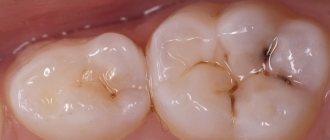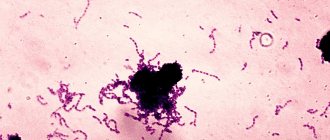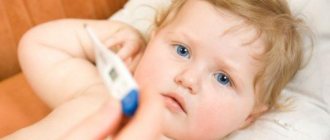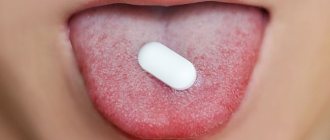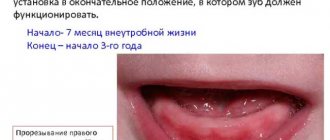Author's rating
Author of the article
Shutofedova Ksenia Yurievna
General practitioner
Articles written
578
about the author
For every mother, the appearance of a child’s first tooth is a whole event, but such joy is often overshadowed by fever, runny nose, cough, bowel movements and other unpleasant and frightening symptoms.
During the teething period, most babies behave very restlessly, are constantly capricious, and refuse to sleep and eat. Many doctors, including pediatrician Komarovsky, beloved by all mothers, believe that a runny nose and cough during the appearance of the first milk teeth is a physiological process and there is no need to worry about their presence. During this period, the main thing for parents is to create good conditions for the baby, and also to closely monitor the symptoms themselves. The appearance of cough and snot during teething is most often a specific reaction of the body to damage to the periosteum and gums by a growing tooth. Against this background, the baby’s immunity is significantly reduced, which increases the risk of a viral or bacterial infection when teething. That is why, when such symptoms appear, the child must be shown to a pediatrician who can assess the general condition of the baby and give useful recommendations to parents.
Cough during teething
Coughing during teething is not a common symptom. The nature of its manifestation allows us to determine whether it is a consequence of the disease, or whether it is caused precisely by the process of formation of new teeth.
A wet cough during the development of the first teeth in children, caused by excessive salivation, usually disappears after 2-3 days and eliminates the need for any special treatment. Examine the skin around the baby's mouth - it usually appears irritated due to expectorated saliva, which indicates the natural origin of the symptom (the expectoration reflex) during teething.
If there is a frequent cough and runny nose, as well as shortness of breath and wheezing that persists for more than 2 days, then it is necessary to invite a doctor to examine the child, since these symptoms may indicate a disease.
Also, children may experience a dry cough at this time. Most often it occurs after a child has been crying for a long time due to prolonged nasal congestion.
Increased saliva production
When the body begins to prepare for teething, the baby increases blood supply and circulation to the mucous membranes and gums, which irritate the teeth that are about to break through. This includes increased blood circulation in the area of the salivary glands and nasopharynx, due to which salivary secretions begin to appear in excess quantities in the child’s mouth. It is also present in the nose, and is often mistaken by parents for snot.
One of the signs of teething is increased salivation.
Saliva, among other things, is the body’s protector from bacterial attack. In young children, it does not yet possess all the enzymes that help fight harmful microorganisms, but, nevertheless, it is already able to secrete the enzyme lysozyme in small quantities, which has an anti-inflammatory and antibacterial effect. It is precisely this that is necessary for the natural fight against the inflammatory process on the mucous membrane, without which not a single tooth erupts.
Excessive amounts of saliva accumulate in the baby’s mouth, some of the saliva flows out, and some enters the gastrointestinal tract (which is why the child may experience loose stools and diarrhea). If the baby is in a lying position, then saliva enters the nasopharynx, flows down the back wall of the throat, causing irritation, and the body turns on protective mechanisms, which is why the cough and runny nose so familiar to everyone appears. But if the cause of cough and snot is determined precisely, i.e. It was drool that was to blame, so don’t give your babies expectorants; 3-4 days after teething, such symptoms will go away on their own.
How to treat
First of all, during a severe cough, it is necessary to eliminate the pain from teething. To do this, the baby should be offered to chew a chilled teether or massage the gums. If the pain does not disappear, then it is advisable to use medications in the form of gel, ointment, syrup or rectal suppositories.
Online consultation with a doctor of the highest category : “...can teething be accompanied by a cough?”
To prevent the baby from being tormented by a night cough while teeth are growing, it is recommended to regularly rinse the nose with a special bactericidal solution from the pharmacy, a self-made product based on salt or medicinal plants. This will prevent drying out and accumulation of mucus. In addition, as prescribed by a doctor, various drops/sprays can be used to moisturize the nasal sinuses: “Aquamaris”, “Salin” and others.
Due to the fact that a runny nose and cough can be a consequence of an infectious disease or acute respiratory infection, Dr. Komarovsky recommends that after the formation of baby teeth begins, ask your pediatrician what immunostimulating drugs can be given to children during this period in order to increase the body’s protective functions.
When wondering how to treat a cough during the appearance of molars, you should also remember about simple folk methods. For example, you can achieve natural flow of phlegm and saliva along the wall of the larynx without drugs or rinses by lifting the child’s head when he is lying in the crib. In addition, it is recommended to regularly offer your baby his favorite drinks and ventilate the room - these measures will reduce the likelihood of inflammation and prevent the mucus from drying out.
Why does cough and runny nose appear during teething?
The process of teething in infants is laid down by nature itself, so parents need to be patient during this period and help the child to make this period as painless as possible. For some children, the first teeth appear almost imperceptibly, while for others the process of their appearance is very painful and lengthy. In order to understand the reason, you need to know why a runny nose and cough appear during teething.
Due to the anatomical structure of the mucous membrane of the mouth and nasopharynx, which are very close, any inflammatory process can lead to the appearance of snot and cough. When teeth are teething, there is an increased production of saliva, which flows down the back wall of the nasopharynx, which provokes a wet cough. Basically, during this period, the cough is wet and appears intermittently.
What the experts say
Many modern mothers love to listen and watch Dr. Komarovsky’s programs, so it will also be useful for you to know what he thinks on the topic of cough and runny nose during teething.
Komarovsky believes that often when a child begins to cough at the age of six months and older, parents cannot always adequately assess the situation on their own; they are sure that teething is the cause. Although viral diseases are also to blame, to which the baby becomes especially susceptible from this age due to the characteristics of the immune system. However, if the baby is active, then the doctor sees no reason for concern, but still advises to consult your pediatrician in any situation.
Notice
: Undefined variable: post_id in
/home/c/ch75405/public_html/wp-content/themes/UltraSmile/single-item.php
on line
45 Notice
: Undefined variable: full in
/home/c/ch75405/public_html/wp-content /themes/UltraSmile/single-item.php
on line
46
Rate this article:
( 3 ratings, average: 5.00 out of 5)
prevention
Consulting specialist
Varlamova Tatyana Vitalievna
Specialization: Dentist-therapist Experience: 6 years
How to distinguish normality from pathology
| Symptom | Norm | Pathology |
| Cough |
|
|
| Runny nose | Often occurs against the background of the eruption of fangs and incisors (“eye teeth”): the secretion secreted from the nose is always transparent and liquid, reminiscent of water | The secretion from the nose was only liquid and transparent at first, but after 1-3 days it thickened, the snot became yellowish or green. Nasal congestion appeared. |
| Temperature | 1-2 days before teething, the temperature can rise to 37.5-38 degrees. Easily removed with antipyretics. | High fever is difficult to control with medications such as Nurofen and Ibuprofen and increases quickly. |
| Vomiting and diarrhea | No vomiting. Diarrhea can be observed for several days, but no more than 2-3 times a day. | May be. If vomiting is accompanied by diarrhea, it indicates the appearance or addition of rotavirus or intestinal infection. |
When teething, a large amount of saliva is released, which flows from the mouth onto the baby’s chin and lips, and the skin around the lips becomes irritated and reddened from constant humidity, and a rash may even appear on it. You also have to change the baby’s clothes almost every hour, because the baby’s entire chest is also covered in drool. All these are signs that the cough is not a symptom of pathology or a serious illness. In this case, there is no reason to panic, just do not forget to wash the child’s face with water more often and remove drool with a handkerchief. Use ointments and powders to relieve skin irritation.
According to some famous doctors and pediatricians, coughing on teething teeth can occur either wet or dry. Most often, it appears after the baby has been crying for a long time, as a result of which breathing becomes difficult and the throat becomes dry and sore, which is why the so-called “cough reflex” develops. In particular, Dr. Komarovsky shares this opinion.
Weakened immunity
The eruption of the first milk teeth is associated with great stress for the body, and local immunity is greatly weakened even despite the active production of saliva. That is why, against the background of teeth growth, a child so often “grabs” various viruses, which leads to the development of ARVI. In this case, cough and snot no longer occur during teething, but during the development of viral diseases. Or, as we used to call all respiratory pathologies, for colds.
“My first child and I, while we were wondering whether the cough could be due to teething, ended up in the hospital because... received ENT complications. We read all sorts of information that this situation was supposedly normal, so they launched it, everyone thought it was too much trouble. True, after discharge the tooth did come out, but it looks like we had two troubles at once. So, it is better to go to the doctor immediately if your child coughs. With the second one, I won’t even think about it.”
Olga, from correspondence on baby.ru
Weakened immunity during teething can cause a cough.
But how can you distinguish between normal and pathological? Where is a serious disease that requires treatment and observation by a doctor, and where are the symptoms associated solely with teething? Let's look into this issue further.
Guide to action for moms and dads, grandparents
To ensure that phenomena such as a runny nose and cough cause minimal discomfort to your baby, try to take care of a few points:
- maintain an optimal level of air humidity in the room: so that the cough is not dry and goes away easily, maintain a suitable microclimate in the room where the child is most often located. The room needs to be ventilated more often (naturally, we take the child out of the room), maintain air humidity in it at 40-60% - for this you can purchase an air humidifier or use the old folk method and place containers of water in the room near the heating devices. It is also advisable to carry out wet cleaning of the apartment every day, wiping not only the floors, but also shelves, toys,
- Buy an aspirator: with its help you can easily remove mucus from the nose of those babies who have not yet learned to blow their nose on their own. Today, pharmacies sell electrical, mechanical and vacuum aspirators. If you don’t want to spend money on an aspirator, then you can use a regular small enema as a “nozzle suction”,
An aspirator will help get rid of mucus in the nose - Give the baby warm liquids, but feed only on demand: if the child doesn’t want to eat, don’t force him,
- do not wrap your baby so as not to cause an increase in body temperature,
- arrange more walks in the fresh air with your child, even in winter (but only if there is no temperature),
- moisturize the mucous membrane of the nose with saline solutions, you can also do inhalations with saline solution,
- prepare the sleeping place correctly: to prevent drool from entering the nasopharynx during sleep and to allow breathing to be free, slightly raise the baby’s sleeping place (about 15 degrees). You can use a large pillow for these purposes or additionally place something under the children's mattress in the place where the baby's head will be,
- speed up the teething process: buy a silicone brush to care for the first teeth and gently massage the baby’s mucous membrane with it. Invest in cooling teethers and pacifiers.
Silicone teethers will help your baby during this period
And the most important thing that is required from caring parents is attention and patience towards their kids. After all, only your love and care will help the little ones survive this difficult period. And if you suspect that cough and snot are the causes of colds or other diseases, and are not at all associated with teething, be sure to contact a pediatrician who will prescribe adequate treatment. This is especially worth doing if the cough has become so strong that the child is coughing, he has convulsions, wheezing and other alarming symptoms. Then, without delay, call “03” or “112” at any time of the day (from mobile phones - “030”).
Comments
What kind of throat should it be if a child has a cough due to teething?
Kelli (03/21/2019 at 02:11) Reply to comment
- Normally, the neck should be pinkish, but during teething it may turn red. If a child has a red throat, it is recommended to consult a pediatrician, and if there is plaque on the oral mucosa, a trip to the doctor should not be ignored at all, because it can signal the development of a sore throat, which at such a young age is very severe.
Editorial staff of the portal UltraSmile.ru (03/24/2019 at 10:18 am) Reply to comment

